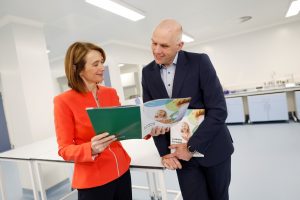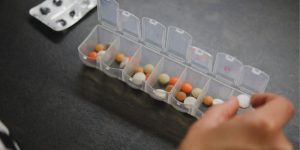[vc_row][vc_column][vc_icon icon=”fa fa-file-pdf-o” icon_color=”color-188384″ size=”fa-5x” title=”Generics@5 Report” link=”url:http%3A%2F%2Fwww.medicinesforireland.ie%2Fwp-content%2Fuploads%2F2017%2F06%2FMedicines_for_Ireland-Generics%405.pdf||target:%20_blank|” link_text=”View report”]July 2018[/vc_icon][vc_column_text]A representative body for Ireland’s largest medicine suppliers has warned that medicine costs for the HSE and patients will continue to increase over the period ahead unless further reforms are prioritised.
Medicines for Ireland (MFI), the representative body for the generics, biosimilar and value-added industry, whose members are the largest supplier of medicines to the HSE, has cautioned that the Government’s failure to reform key areas of our medicines market is resulting in increased medicine costs and leading the State to lose out on savings of at least €138 million annually.
MFI today, (Thursday, 12 July) published its new policy document — ‘Generics@5 – Affordable, Accessible for All’—which marks five years since the introduction of generic substitution and reference pricing in 2013.
At that time, the Health (Pricing and Supply of Medical Goods) Act 2013 changed Irish law to make it mandatory for pharmacists to substitute costlier branded medicines for more affordable generic medicines, in most cases, once the medicine’s patent protection had fallen.
The Act, for the first time, allowed both the HSE and private patients to opt for equally effective but more affordable generic alternatives.
Key achievements derived from generic substitution over the period have included:
- €1.6 billion in savings delivered to the Irish State since 2013
- The average wholesale price per pack of medicines has fallen from €18 in 2012 to €6 by 2018
- For example, overall spend on Ireland’s most used medicine, statins—used to lower cholesterol—has fallen from €160 million to €36 million per annum
While the 2013 Act delivered significant savings to the Exchequer, our health service and patients, MFI in its policy document warns that this flow of savings is now at an end. MFI asserts that the failure of the Minister for Health to continue this programme of reforms beyond the 2013 Act has meant that medicine spend in areas such as the High-Tech Scheme have accelerated rapidly in recent years. For example, spend on this scheme has almost doubled from €337 million in 2009 to €662 million in 2017.
The lack of focus on further reforms comes at a time, when the HSE faces a potential budget overrun of €600 million by end 2018.
“Our population is ageing. Despite living longer, we are now impacted by a greater incidence of chronic disease. That brings with it an increased need for medicines—but sadly, today, access to them is no longer guaranteed,” said Owen McKeon, Chairperson of Medicines for Ireland and Country Manager of Mylan.
“The challenge for our Government now is how to maintain affordable access in the years ahead. The priority has to be to continue to reform,” he said.
MFI has set out a number of immediate reform proposals, which it estimates can deliver almost €140 million in savings per annum. These include:
- A new National Medicine Pricing Agreement with the generics industry to drive further reforms;
- Increasing competition in Ireland’s medicine market, particularly in the low-volume, low value medicines market, which would deliver at least €75 million in savings;
- Immediate publication of a National Biosimilar Strategy, which was first promised in February 2017 and which has the potential to deliver €25 million in savings;
- Changing existing legislation to provide all new patients with generic medicines would yield €18 million in savings;
- Reform of the High-Tech Scheme to provide €20 million in savings.
Mr. McKeon further added: “Today’s policy document shows that when reforms such as generic substitution were implemented in 2013, they yielded €1.6 billion in savings for our healthcare system and patients.
“Since then, the pace of reform has stalled and our medicine spend is now beginning to escalate again. Just one example of how to stop this upward trajectory is a National Biosimilar Strategy. This would stimulate increased uptake of more affordable biosimilar medicines. Unfortunately, it has now been delayed by the Minister for Health for over a year.
“The lack of a dynamic and competitive medicines market in Ireland, threatens not only the State’s capacity to meet patient needs, but also undermines continuity of supply. Medicines for Ireland is calling on the Minister for Health to implement our proposals to safeguard patient well-being.”[/vc_column_text][/vc_column][/vc_row]







